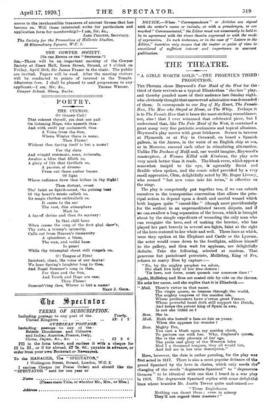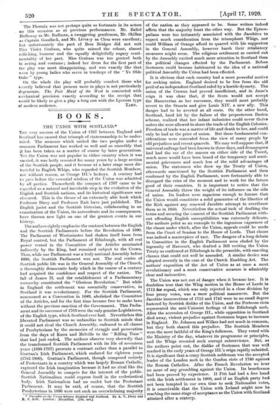THE THEATRE.
" A GIRLE WORTH GOLD."—THE PHOENIX'S THIRD 1 PRODUCTION.
THE -Phoenix chose Heywood's Fair Maid of the, West for. the third of their revivals as-a typical Elizabethan " shocker " play, and thereby puzzled most of their audience last Sunday.night, . who obviouslythought that unreserved admiration was demanded of theist- It corresponds to our Boy of My Heart,- The Female-. Hun, The Man who Stayed at Home, or The Whip. Perhaps it is to The Female Hun that it beam the most striking resemblance, not, alas I that I ever witnessed that celebrated piece, but I understand that, like The Fair Maid of the West, it contained a great many very fine patriotic, sentiments and topical allusions. Heywood's play moves with great briskness. Scenes in-taverns at Plymouth or at Foy in Cornwall, on board a Spanish galleon, in the Azores, in the waist of an .English.ship at sea, or in Morocco, succeed each other in stimulating alternation.
Unlike The Duchess of Mal,fi and, one would imagine,.Heywood's masterpiece, A' Woman Killed with Kindness, the play acts very much better than it reads. The blank verse, which appeals - somewhat- insipid to the eye, is agreeably fluent and flexible when spoken, and the comic relief provided by a very small apprentiae, Clear, delightfully-acted by Mr. Roger Livesey, who seemed " but new come into his teens," is effective on the stage..
The play is competently put together too, if we can submit Ourselves to the transpontine convention that allows the prin- cipal action to depend upon a death and mortal wound which both happen quite " casual-like ." (though most providentially for the author) in. an unpremeditated tavern dispute, and if we can swallow a long-separation of the lovers, which is brought about by the simple expedients of 'wounding the only man who can. recognize the hero, and of making the heroine, who has played her part bravely in several sea-fights, faint at the sight Of the hero restored toner whole and well. Those lines at which, Were they. spoken at the. Elephant and Castle or the Lyceum. the actor would. come down to the footlights, address himself to the gallery, and then wait • for applause, are delightfully definite. Take the following, selected at random. That generous but pasteboard potentate, Mullisheg, King of Fez, frefusee.to marry Bess by capture :—
, "No, by the mighty prophet we adore, She shall live lady of her free.desires :
'Tin lover not force, must quench our amorous Tiros 1" Again, Maisheg and Bess are seated side -by -side on the throne: He asks-her name, and she replies that it le- Elizabeth :— " Mall. There's virtue in that name.
The, virgin queen; so famous= .through: the world, The mighty empress of- the maiden. isle, Whose predecessors have o'errun -great France, W5E:me powerful hand doth still' support the Dutch, And keeps the potent king of Spain m awe, Is- not she titled so f
Bess. She is.
Mull. Hath she herself 'a faoe so. fair as -yours, When she appears for wonder ?
Bum Mighty Fez, You cast a blush upon my maiden cheek, To pattern , me with. her. Why, England's queen; She -is -the only phoenix of her age, The pride. and glory of the Western Isles. Had I a thousand tongues, they all would tire, And fail me in her true description."
Here, however, the date is rather puzzling, for the play was that acted in 1617. There is also a most popular defiance of the proud Spaniard by the hero in chains, which only needs the' changing of the words "degenerate Spaniard " to " degenerate German " to be identical with one that I heard in a war play in 1916. The degenerate Spaniard replies with some delightful
lines whose beauties Mr. Austin Trevor quite understood :— " These Englishmen
Nothing can daunt them ; even in misery They'll not regard their makers 1"
The Phoenix was not perhaps quite so fortunate in its actors . an this occasion as at previous performances. Mr. Baliol Holloway as Mr. Ruffman, a swaggering gentleman, Mr. Skillan as Captain Goodlack, and Mr. Lives3y as Clem were excellent; but unfortunately the part of Bess Bridges did not suit Miss Violet Graham, who quite missed the robust, almost rollicking, humour and the equally delightfully sugary senti- mentality of her part. Miss Graham was too genteel both in acting and costume ; indeed her dress for the first part of the play was most disappointing, and was exactly like that worn by young ladies who serve in teashops of the " Ye Olde Oake " type.
On the whole the play will probably comfort those who secretly believed that present taste in plays is not particularly degenerate. The Fair Maid of the West is concocted with mechanical precision exactly according to the receipt that would be likely to give a play a long run with the Lyceum type



































 Previous page
Previous page